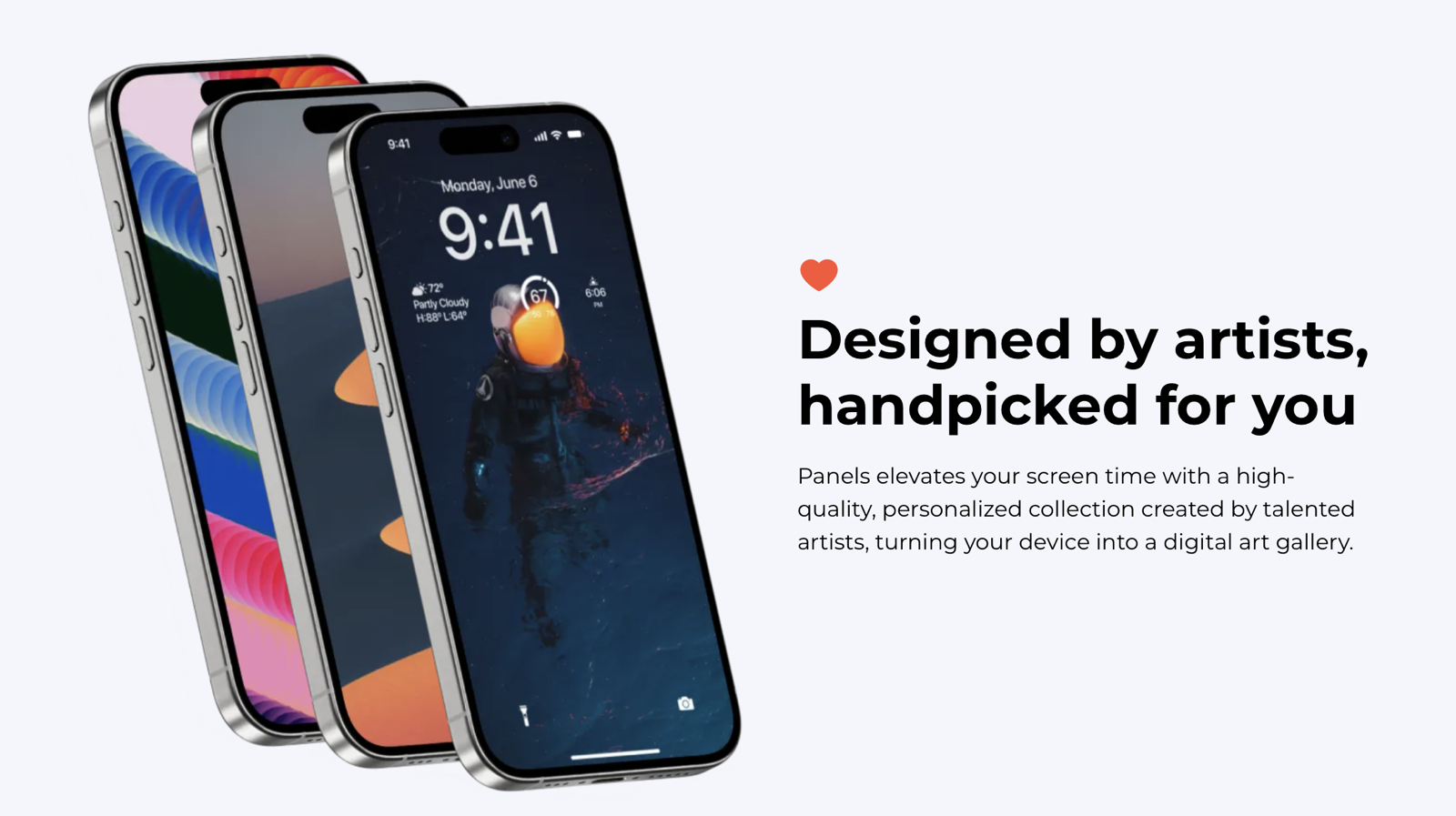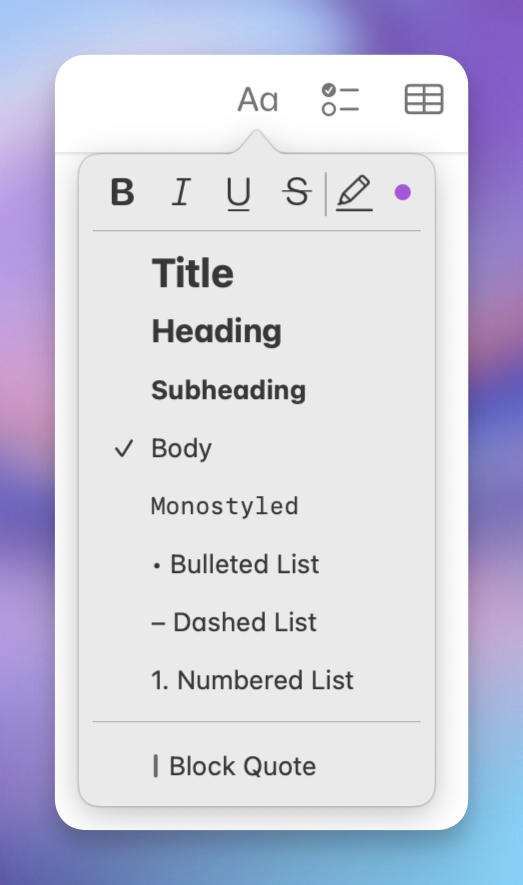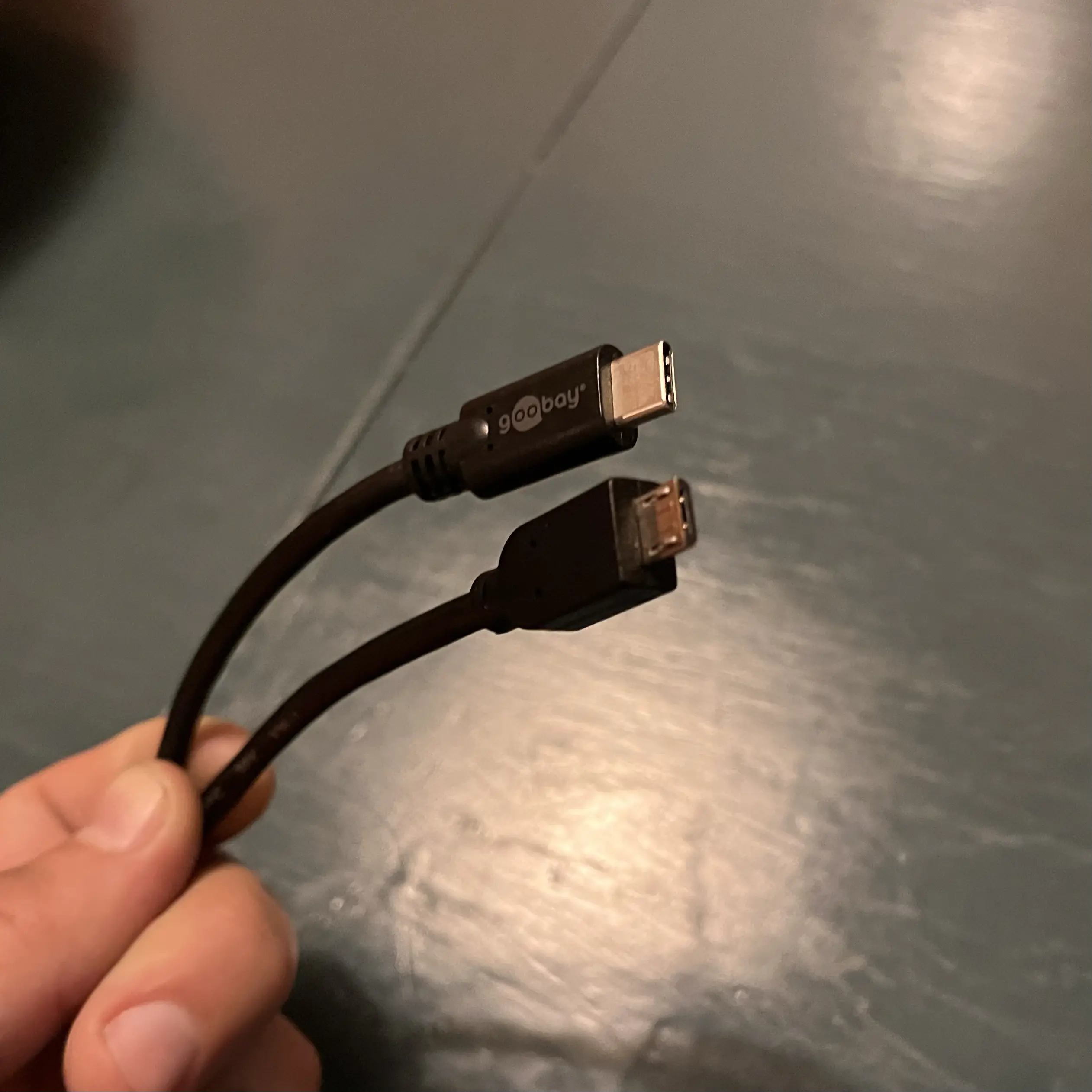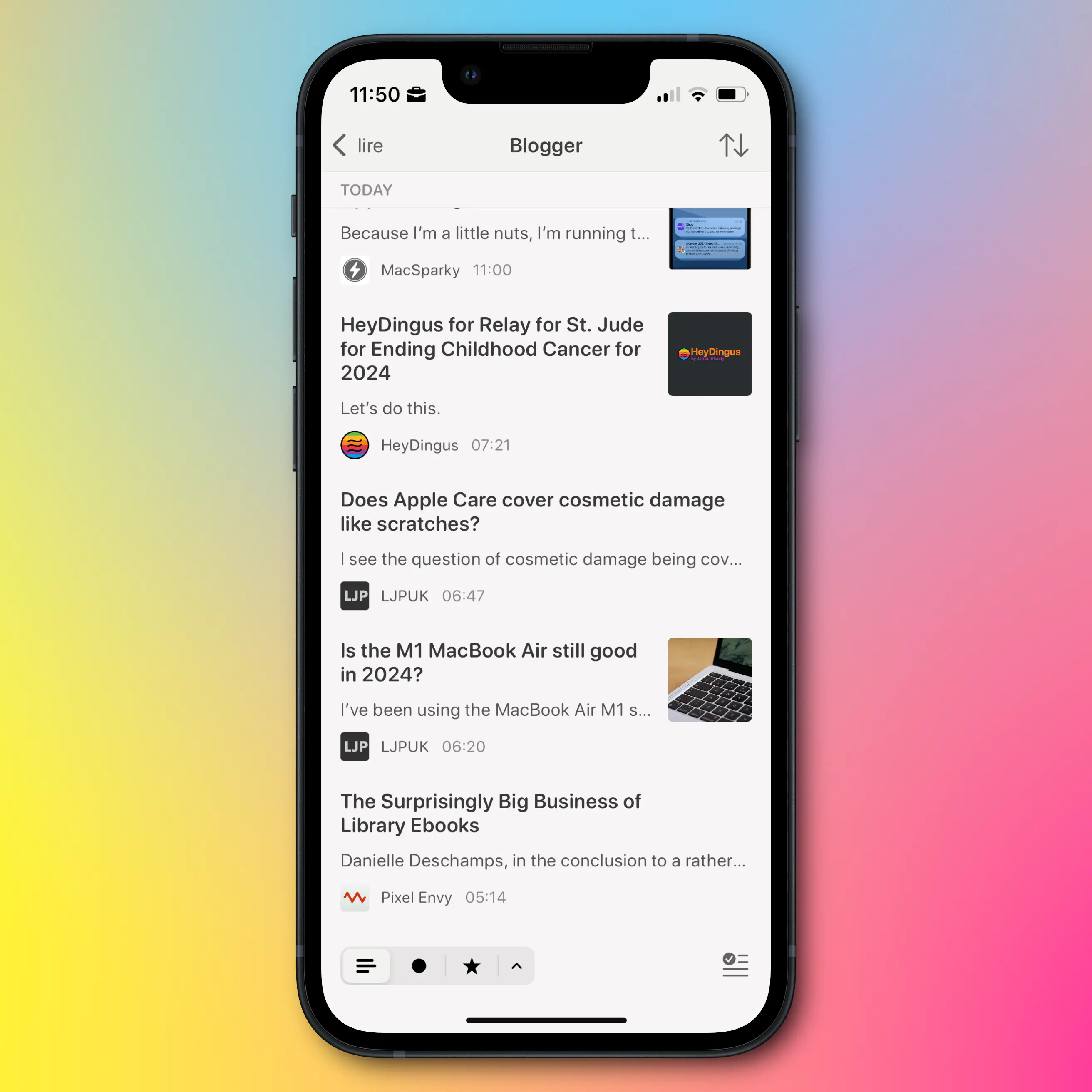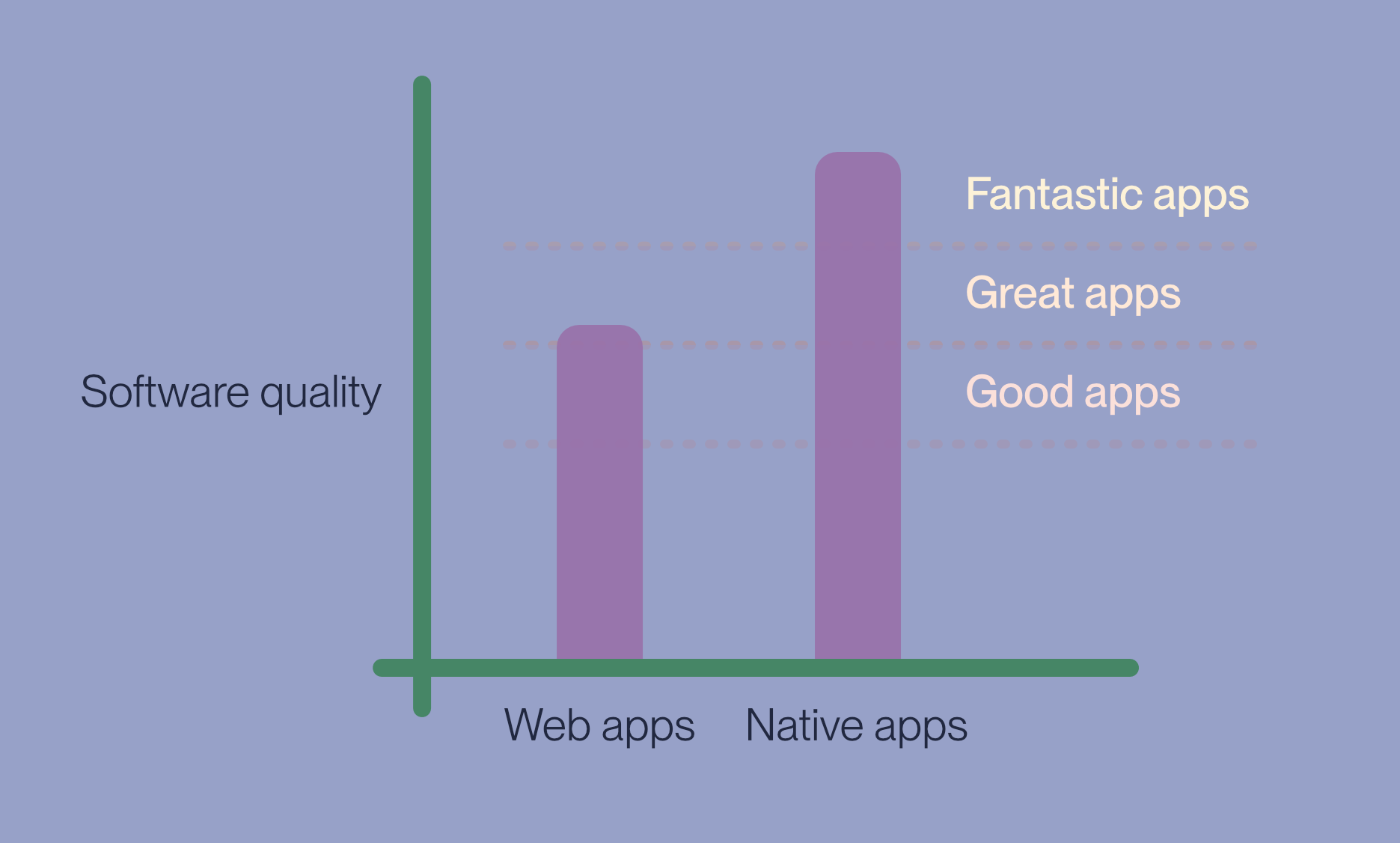Musings
- The name
- The price
- The split
- The privacy
- In general, I like to rely on third-party services.
- I also like the portability of Markdown, and being able to use several apps on the same files.
- I like that, in NotePlan, I can use the same app for notes and tasks.
- Good apps on both Mac, iPad and iPhone, while also being accessible on the web
- Pretty good collaboration features, with shared notes and folders
- More than enough options for formatting
- Collapsible headings
- Embedding of files, photos, and illustrations (especially good with PDFs)
- Audio recordings
- Links between notes (no backlinks, though)
- Tagging and smart folders
- Quick notes (which Apple, selfishly, reserves for itself)
- Math notes.
- USB-C Power brick (in the wall)
- USB-C to USB-C cable
- iPad Pro’s Magic Keyboard (which charges the iPad)
- USB-C to Micro-USB cable (in the iPad itself)
- Satechi remote
- Tidal: €11.64
- Apple Music: €7.25
- Spotify: €2.88
- Security
- This is important, both for the people inside and outside the car!
- … but it’s not the only factor, of course.
- Features
- Size, range, etc. — things you can do with it.
- Comfort, and sense of quality
- This isn’t about what you can do with it, but how it feels to do them. In a car, this could be sound (or lack thereof), looks, driving experience, how it feels to open and close the doors, and other small, and large, things.
- Price
- Maybe this shouldn’t be here — but when picking a car, it’s often about getting the most features, comfort, and security for the price.
- (“Quality” can also be interpreted as how fast it breaks, which could also be included in the cost of owning the vehicle.)
- Sometimes Apple will make something more private because they hope it will be a selling point. I don’t mind that at all! That’s “just as nefarious” as them making something good because it will sell.
- Other times, Apple will make something more private that just so happens to benefit Apple and harm their competitors. A good example here, is them locking down the NFC chip on iPhones. (Here’s a good post discussing this.)
- And sometimes they’ll do something that benefits them even though it’s bad for their users' privacy. For instance, they don’t mind tracking us to serve us ads, as long as they’re the ones doing it.
- For reasons, I’ll touch on later, this is mostly about desktop browsers.
- In terms of privacy and security, I’m approaching this from a reality where 65% of people use Chrome. So in this context, vastly improving the privacy from that, is more interesting than saying someone is a gullible idiot if they don’t use a Tor browser. 😛 So while I’m not saying those things shouldn’t be part of the discussion at all, I’d like to talk more about user experience and features than hardening if you catch my drift. 1
- If you get an idea while writing a post, you should always finish this new idea before finishing the original one. This, of course, cascades to new ideas you get while working on the second one, etc.
- This also applies to expansions within an idea. You can always increase the scope of a project!
- Let every piece of work be your Magnum Opus.
- However, if as much as a single piece of your idea doesn’t materialise quite like how you wanted it to, scrap the entire thing. No matter how much work you’ve put into it, and no matter how much value there’s still left.
- Don’t post anything, unless you’ve covered every nuance, use case and possible objection. Don’t post ideas or thoughts — post rigorous conclusions.
- You can’t mention a concept/item without also explaining everything about it, in case someone isn’t familiar.
- I don’t love that Arc is built on Chromium — as I think Google has more than enough power over the web as it is.
- I’m not against supporting any VC funded company — but in combination with an unclear business model, I become more skeptical and worried if our incentives align. 2
The Idea of Marques Brownlee's App Panels is OK
But I Have Several Problems With It
With the review of the latest iPhones, Marques Brownlee/MKBHD also revealed his latest project: The app Panels.
And I don’t mind the idea:
He’s hinted at expanding it in the future, but currently the app is an app to get wallpapers. You can get some of them for free (and by watching ads), but you can also buy packs of them, or subscribe to the app to get access to everything. The money is split between the app and the artists.
Wallaroo, by Iconfactory, is already a paid app for wallpapers, and Walli is an example of an app with a model where artists can upload their work.
In general, I feel like people’s expectations of stuff being free online is too high, so I don’t mind a new paid option in the market.
But these are my problems:
1) The name
My Biggest Small Gripe With Apple Notes
And (Obviously) Objectively Correct Principles for Paragraph Spacing
I think Apple Notes might be one of the best pieces of software Apple ships. They’ve nailed creating a simple app, with great ease-of-use, that still has more powerful features hidden, for those who want it. There are a couple of reasons why I don’t use it much, though:
However, Notes has numerous nice features, like:
So I’ll gladly recommend it to most people!
However, as most Apple software, Notes is pretty inflexible. If you don’t like their choices, you’re out of luck. And I really don’t like their choices when it comes to paragraph spacing.
My paragraph spacing commandments
The Story of My 1962 Bass Guitar
My Most Treasured Possession
In 2010, I went on a school trip from Norway to Los Angeles. I wanted a new bass, so I took a chance, and sold both basses I had at the time, to have funds to spend in L.A.
I was looking for a P-bass
But after not finding anything interesting in Guitar Center and other “regular” music stores, I searched online. There I found a store called Norman’s Rare Guitars. I didn’t know it at the time, but it’s one of the world’s most highly rated vintage shops – and they had a real bargain. You see, Fender instruments from the early 60s are expensive – especially the “Pre-CBS” ones.1 To put things into perspective: Norman’s have one currently, in great condition, which they want $10,900 for!
The one I ended up buying was even older, from 1962, but “only” $3,000. Not only that, the currency rate was much more favourable, from Norwegian Kroner, at the time. I paid what today would be $1,700.
Why it was so much cheaper
The guys as Norman’s said that the bass spent most of its life in the possession of a man they know who was. However, he wasn’t a stranger to experimenting with chemistry and his own blood – and the bass bears witness to this.
Here’s what I know about originality
I know that the volume pot is new (as I’ve swapped it myself) – and I don’t think the knobs are original.2 The rear strap button has been moved (to accommodate the heavy tuners). The headstock strap button is missing, alongside the pickup and bridge covers. However, as far as I know, the rest is original: Neck (more on this later), thumb rest, bridge tuners, pickup, and electronics.
As mentioned, my bass used to look like the one in the image above here – same finish and all.3 But now, and when I bought it, it looks like this:
No, You Don’t Need USB-A on Your Desktop Computer
The first redesign in a decade for the Mac Mini is near. And the rumours point towards Apple removing the USB-A ports on the current models, in favour of USB-C ports. And to the surprise of no one, people are moaning about losing their precious ports, as if they were buying a laptop in 2016.
But, just like Freedom …
USB-A isn’t free
First, let me be clear: I’m not discussing the number of USB ports – I’m discussing the types. So, for instance, I’m evaluating 5 USB-C ports vs 3 USB-C ports and 2 USB-A ports.1 So “just keep the USB-A ports” wouldn’t come for free, it would come at a cost of more of the future-proof2 port type.
Another “cost”, is that the longer computer makers ship products with the port, the less pressure Logitech et al. feels to update their peripherals to USB-C.
I know this might sound a bit harsh, my clear advice is …
Get over it
“But I don’t want dongles”, I hear you say. Well, I think there are satisfactory ways to adopt the USB-C Lifestyle without becoming a permanent resident of Dongle Town – which doesn’t include buying numerous new devices.3 Yes, I know this comes at the cost of maybe €10-30 (depending on your setup) – but just factor it into the cost of the €500-1000 computer, and it will be fine. And your life will be better for it!
Here are my two main tips, as someone who’s deep into the lifestyle.
1) Buy some new cables
I have an older Satechi presenter, which charges with Micro-USB (boo) and came with a USB-A to Micro-USB cable.
However, I’ve bought this cursed contraption:
I don’t love having to lug around that stupid cable4 – but it sure works to pull an older device into the USB-C age. All my power bricks 🖇️ are USB-C, so I can charge it directly there. It can also charge from my tablet, laptop or the theoretical USB-A-less Mac Mini.
I’ve most often used it with an iPad Pro (with a Magic Keyboard) – and an advantage of bringing things into USB-C, is that it also makes things work better with more “port constrained” devices, like the iPad. So I would, for instance, run things like this:
That cable would (probably?) also allow the remote to be charged from a newer iPhone!
So, my first recommendation is to see if any of your “USB-A devices” could become “USB-C devices” by just buying a new cable.
2) Buy some adapters
The Beauty of Third-Party Services
and Open Protocols and Standards
I’m very much what you’d might call a software snob. Not only do I care about unnecessary things like how an app looks – I also care about how it feels. I’d also say that apps are an interest/hobby of mine, and I love testing new things. So I love open and portable stuff, so that I’m always able to use the software I prefer. Allow me to explain, with four examples: RSS, Email, Browsers, and Markdown.
RSS
My current RSS reader of choice, is Lire. It doesn’t look and feel quite as nice as Reeder and Unread, but it is still good in this regard. However, I love that I can customise the look, that it caches truncated RSS feeds, and that I can (on a feed-by-feed basis) load an inline web browser. This makes it possible to read blogs with their original design, which I think is neat.
However, my feeds don’t live in one client. They’re synced with Feedbin. This makes it trivial to move between clients, and I can even use several in parallell, as things like sorting and read status instantly sync between them. Maybe I prefer Lire on mobile and Unread on Mac, for instance?
Portability is an important principle here. And if I want to move from Feedbin to Inoreader, for instance, I can easily export my feed subscriptions as an OPML file, which I can then import into Inoreader.
So I’m not locked in anywhere, and I can use the client I prefer everywhere. This reality is what I wish I could have for music streaming as well, as I’ve touched on here. It also shows why I want less bundling and integration.
Notes on cross-platform-ness
My best friend, and fellow nerd, has always been adamant in using cross-platform tools – the reason being that he can be flexible in terms of which hardware he uses. He can easily switch between Windows, Mac, iPhone, Android, etc. However, this doesn't gel well with my software snobbery, as most of the best apps (in my opinion) simply aren't cross-platform. I have the same issue with web apps – I love their flexibility and portability, but I don't love using them. So the approach laid out in this post, is my approach to the same idea. But yes, it would be even more robust if I only used web based and cross-platform tools.Now, as opposed to with RSS, there’s not many good email clients… But the same principles apply!
I host my email with Fastmail 🖇️, and I’m very pleased with it.1 But if I still want to switch later, I don’t use an @fastmail.com address. Instead, I use my own domain, hosted on Hover 🖇️ – so I don’t have to change address if I change hosting. I can also change where I have my domain without having to change anything regarding my email.
Now, I don’t like the default Fastmail client – but email being email, I can use a client I dislike less instead!
Browser
Please Stop Saying "Telegram Isn't Encrypted"
You’re not helping - draft 2
Telegram is back in focus these days – and, as usual, not for good reasons. I will write more on this later, as I will have to figure out how to deal with the very real concerns I have with the chat app I use the most. But now I wanted to focus on one thing that’s annoying me a lot, for instance in the latest Vergecast episode.
Why it’s a bad idea to say things that aren’t true
I think it’s crucial to get the word out, that Telegram isn’t as safe as Signal1 – and I applaud those who want to shine a light on that fact. The problem is, that many of them (like Nilay Patel) do it by saying that “Telegram isn’t encrypted”. But what happens if someone has heard that phrase, and then later learns the fact: That Telegram is encrypted.2 They will then perhaps disregard the entire notion, and maybe assume that Telegram is as secure as Signal after all.
My issue with that phrase is that it erases the essential distinction between just “encryption” (or “server encryption”) and “end-to-end-encryption”.
Here’s the difference:
How to use your market dominance
What do you do if you’re dominant in some markets, but wished you were more dominant in others?
If this isn’t one of the clearest examples of the problems with too much bundling and integration, I don’t know what is.
So, Apple (the phone maker) is artificially nerfing the competition of Apple (the music streaming service), unless they agree to build stronger integration with Apple (the smart speaker maker).
At imaginary HomePod meeting:
Some guy: “Our speaker would benefit from Spotify integration, but they would rather not build it for free. Should we pay them, like how we demand payment for integration with our stuff?”
Another guy: “No, I have a better Idea: What if we called Federighi, and threatened them instead? We could remove a useful feature that Apple Music (their main competitor) has, unless they agree to our demands.”
Some guy: “Oh, yeah – that’s way better!”
Now, I’m not saying it went down just like that. But it is awfully “convenient”, isn’t it?
So, to be clear, this is the situation:
As I’ve mentioned previously, I moved from Spotify to Tidal this year, due to artist payments. (Now, I’m not sure whether I got that right – but that’s another case.) And the main thing I’m missing from Spotify, is the excellent Spotify Connect. This is both a way of streaming music to different speakers and devices, and a way to control the Spotify playback from any device. For instance, let’s say I start the playback on my iPad, connected to a speaker via a mini-jack. If I then open Spotify on my phone, the playback controls are “live”, like if I streamed from my phone. I can also say “Nah, move the playback to my Sonos speaker instead”.
What Apple has done, is removing the ability to use the phone’s physical volume buttons to control the Spotify Connect volume. So if you listen to Spotify on your phone, with AirPods, clicking the buttons adjusts the volume. But if you then move it to your Sonos speakers, it suddenly doesn’t – it only adjusts the phone’s notification volume. I really don’t like this disconnect.1
Apple is saying that Spotify users can get the feature back if Spotify agrees to integrate with the HomePod – and that’s very problematic.
Imagine me, happy as a clam: I had bought a phone that I liked, and was using a streaming service I liked – party due to how well it worked with my smart speakers, which I also like. And now Apple is jumping in, and making the latter two worse, just because Spotify won’t support a speaker I don’t have.
Making Something Bad Easier to Do, Isn’t Good
Should Be Obvious…
Speaking of bad arguments… This, from The Verge and this from Dan More (good posts!) got me thinking of another terrible take I see way too often:
«People have always done Bad Thing (at great expense of some kind), so Company X making it super-accessible isn’t critique worthy at all, actually.»
Edit 27/8-24:
The Verge posted a good, and very linkable, article called Hello, you’re here because you said AI image editing was just like Photoshop. And the comment section is full of the argument above, and also its sibling:
«We’ve always has to contend with Bad Thing – so drastically increasing the amount of it, is of no consequence, actually.»
"It's a Company" Isn't an Excuse
You’ll often hear people say (as excuses to negative conduct) something like: “It’s a company, of course they’re only worried about profits." Or something like: “It’s publicly traded – they have an obligation to work towards growth."
And I simply don’t accept that. I don’t mind companies trying to be profitable – but how you do it matters. The consequences matters. And if a company is already immensely profitable (and already provides lots of value to its shareholders) it’s toxic, on so many levels, to squeeze at all cost.
We need more unbundling, and smaller markets
On separation of clients and services
People stream movies and TV in many ways. (And few do it in only one way.) You can do it through your phone, tablet or laptop, of course – but I think we’ll find the greatest variety when it comes to other forms: Many people have a TV set in addition to these other devices. But the size of your living area and wallet (or simply prioritisation) influences where you are on the scale of “Small and/or cheap TV that does the job” and “High-end OLED beast with Hi-Fi attached”.
But it’s not only about “More money = Better” – people value different things! For some, a VR headset would be a fantastic upgrade — while if you mainly watch TV as a social activity, it’ll defeat the purpose. And some would never swap their 43" Frame TV for a 77" black rectangle on their wall — no matter how much better the picture is. (Or what about a briefcase TV?)
Both through “privilege” and “prioritisation”, we have widely differing budgets — and also different needs and tastes. That’s why it’s so great, that we don’t have to use Netflix through only stuff that they have made!
Imagine if we could only use their service on Netflix TVs, or while sitting on Netflix couches. While there is a connection, making “a service”, and “the ways to interact with the service”, are two different things – that often require different skillsets. Now, you could say the difference here is hardware/software, and that you do have to watch Netflix through their app… I’m not saying either the situation or the analogy is perfect! However, while your brand of TV might also make great speakers, it’s still nice that you can choose your sound experience separately from your visual one. And I also think it would be better if you could also watch Netflix through other apps as well.
Have We Been Evaluating Music Streaming Payments The Wrong Way?
One question that ofter comes up when discussing music streaming services, is: “How much are they paying artists per stream?" And there are many blog posts, like this one, that have tried to figure it out. It quotes some numbers, that I’ve seen several places, for Average Payout per 1000 Streams:
And this was the number that made me change from Spotify to Tidal last year — even though I don’t care about the increased audio quality, and I like Spotify’s app better. Comment sections are also often filled with things like “Spotify don’t pay artists”, etc.
But we might be thinking about it all wrong because here’s the thing: No1 streaming services actually pay per stream. Instead, all the major ones pile up the revenue, and then divide it to artists2 based on the percentage of total streams. So, even if I only listen to Blur, that doesn’t mean my payments only go to that artist.3
An interesting side effect of this is that, if every user streamed the same artists next month, but doubled their streaming amount, the payouts would be the same. But the blog posts above would have to halve the estimate for Payout per Stream.
So while it’s not totally irrelevant, I simply think payout per stream is the wrong number to look at. The more relevant number, is:
The percentage of revenue that goes to artists.
Allow me to explain:
Please Don't Kill The "Today View"
The boys over at the Connected podcast have discussed the Today View (specifically on iPhone) the last few episodes. And late to the party, here’s my short take.
The Today View is the screen of widgets you get to when you scroll left on your Lock Screen or first Home Screen. And they were speculating that it might get removed in time, as it doesn’t get much love from Apple. They didn’t say that they wanted it to go away — but it was also clear that they wouldn’t really mind.
I would.
Because I think it serves a very specific purpose, and fits very well with my use of Home Screens.
Because I’m a One Home Screen Kinda Guy, which I change with Focus Modes. This also makes me a heavy user of the App Library and Spotlight for launching apps and shortcuts. But to me, the Today View is a perfect spot for something I have no other place for: Widgets I always want quick access to, but that I still don’t use so often that it gets a spot on my one Home Screen.
When Was the Last Time You Heard Someone Discuss the "Quality" of a Chat App?
Chat apps: Part 1
What constitutes a “good” car? (Yes, “car” — I’ll get to chat apps, I promise!) If I were to answer for myself, I’d split it up into three factors (with one added as a bonus):
Luckily, the car market is pretty competitive — so there are plenty of options. And you don’t have to buy the same brand as your friends and family! But I want to compare it a bit to chat apps, and both the market and discussions surrounding them. Because even though most of us use chat apps numerous times every day, I’d argue both the market and discussions are lacking.
To me, it seems like most apps only have one of two value propositions —
even though I’d say all the factors from above applies to chat apps as well: Security (and, the connected, but separate, Privacy), Features, Comfort and sense of Quality, and Price. (The way we pay for chat apps is often with “personal data” and “viewing adds”.)
The first proposition is good ol' “Lock-in”
Does Apple "Care" About Our Privacy?
This post was originally a Mac Power Users thread.
One of the questions that started a discussion, was (paraphrased) whether Apple “cares about the privacy of its users”.
I think these are some important nuances to Apple’s decisions surrounding privacy:
And the billions they accept from Google, to make their search the default in Safari, is another example of the latter.
If Apple really cared about our privacy, they would, of course, choose a default that doesn’t track us — like DuckDuckGo. And it feels a bit hollow when they’re like “Yeah, we care about your privacy — but not like not-accept-$20-billion-for-free-care, you know!"
So, while I do think “privacy” is an argument for choosing Apple products, I think they’ve proven that they don’t care about our privacy. Whether that matters, is a different question! ☺️
(This discussion also spurred me to write about my search engine of choice, Kagi.)
🌱 Lead Paint Is Amazing
On “Usefulness” and “Harmfulness”
Why are people so down on putting lead in paint? I mean, as Wikipedia puts it:
Lead is added to paint to accelerate drying, increase durability, maintain a fresh appearance, and resist moisture that causes corrosion. (…)
(…) very popular with artists because of its density and opacity; a small amount could cover a large surface.
And about the alternatives:
Titanium white has far greater opacity and tinting strength than lead white, and it can easily overpower most other pigments if not mixed carefully. Titanium white has been criticised for leading to “chalkiness” in mixtures.
Zinc white dries slowly and creates a relatively inflexible paint film. Critics of the pigment argue that its use leads to excessive cracking and delimitation, even when used sparingly.
Why the hate for the great technology that is lead paint!?
Well, the answer is pretty simple: “Usefulness” and “harmfulness” are completely independent spectres.
I see this conflated a lot in discussions surrounding AI: People who are wary of the harm transformer models can cause, often also call them “useless hallucination machines”. And others, will respond to the claims of harm by pointing to the usefulness.
Yes, the iPad Pros Needed to Be Thinner
I won’t be buying the new iPads, as I’ll keep rocking my 11-inch 2018 (with Magic Keyboard). But one thing has been bugging me about the early coverage of the new models, that I wanted to address. 1
Because, when I watched the Keynote and saw that the new iPad Pro models were thinner and lighter, I immediately went “Nice!”. But I kept seeing (and hearing) comments like this, here exemplified by David Pierce (whom I really like!) on The Verge: 2
Basically, the point is, “Who asked for this? Why not make it thicker and increase the battery life?” Nilay (Patel) agrees with this — but then, six(!) minutes later, answers the question: 3
So yeah, not a long time between them not understanding why they made it thinner and lighter, and complaining about it being too thick and heavy…
Anyone Else Feel Like They Should Use Firefox
… but Still Struggle With It?
This post was originally (and still is) a forum post on the MPU forums. I have two concrete question blocks I’d love feedback on, which I will present during the post. I would love to hear from you, either over at MPU, as a comment to this post on Micro.blog, via Mastodon, or email. 🙂
I’d like to talk about browsers! And people are of course welcome to comment whatever they want — but some notes on what my intentions for this discussion are:
OK, let’s go!
Ethics are always difficult to discuss. Because while I think everyone should be mindful of the small things we should do to improve things, people have different priorities and possibilities. And where should we draw the line while consumers in a problematic system? Like, I should probably use a Fairphone over an iPhone even though it’s worse, right? How much worse should I accept? How hard should I pull away from things like Facebook or X?
Still, I’m at least trying to try — and as the browser is perhaps the most used app, the choice of it is among the things I’m thinking about.
And here’s why I feel like I should use Firefox:
🌱 Advice for How To Make Sure You Never Create Anything
Are you sometimes at risk of creating? Personally I, from time to time, come very close to writing something, so my advice here is geared towards that. However, it can hopefully be extrapolated to help you if you’re tempted by other creative endeavours as well.
Why I Don’t Love Web Apps
And a call for help
I absolutely get why companies make web apps instead of native apps. Why juggle tons of platforms and languages if you don’t have to? Furthermore, being on the web makes you free from platform gatekeepers!
It can also benefit users, by giving the same experience everywhere, making more software cross-platform and accessible on more niche platforms, and more.
And if a developer has 100 hours to develop a client for their service, the user experience very well might be better if they spent all of it on a web app, instead of spending 25 hours on four different native clients.
There’s also a bunch of terrible native (or “native”) apps. One example is phone apps that simply are terrible web wrappers that just want to be able to track and notify you more than they can in a web browser. 1
When I say that I prefer native apps, I don’t mean that there are no great web apps (like Figma) or bad native apps. My point is that the ceiling of the latter is higher, and that all the best apps I’ve tried are native.
✉️ 🌱 To SigmaOS’ CEO: This Is What I Don’t Like About Arc’s Direction
I really, really like the Arc browser. But as I alluded to in this post, I have some reservations regarding it, and don’t feel like it’s going in a direction that I like. In the post, I said that I might try SigmaOS again — and I am. 1
I mentioned this in their community Slack, and their CEO, Mahyad, asked me what about Arc’s direction I don’t like. I must say, the dev team seems very active, nice, and open to input! So this post is my reply to his question.
(And here’s a link straight to the TL;DR at the bottom.)
Hi, Mahyad — and thanks for asking! I wrote a blog post called «I Just Want A Nice Browser!», which might give you a hint, heh.
And let me also say that I’m a bit worried about your direction as well — but I’ll come back to that. 😉
